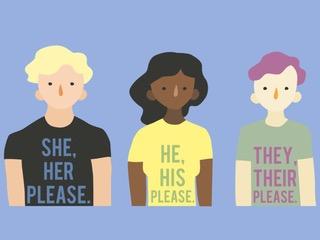On June 19, CUNY officials announced their decision to grant name and gender marker changes to all CUNY students.
The CUNY General Counsel for Legal Affairs issued a statement on June 18, regarding the topic of name and/or gender change requests on school records. In this memorandum, the CUNY community was informed of the recent agreement of the counsel to allow both students and employees alike to choose what name and gender appears on their non-official documents and files.
The motivation behind this official statement stems from frequent inquiries to the Legal Affairs office on possible modifications to a person’s personal information. Realizing the significance that these changes can have on an individual and their self-esteem, the City University stands as an example of inclusiveness and compassion by allowing its community members to make said changes.
“CUNY recognizes the importance that a change of name might have to students during their time with the University,” the memo reads. While name changes cannot be issued on official documents like diplomas, a student can select how their first and middle name will appear on documents such as student identification cards, course rosters and honors awarded by the City University. This rule is protected by the New York City Human Rights Law, which prohibits discrimination of any kind based on race, religion, gender and orientation, among other factors. If students do, however, want to change their name on legal records, all they must do is have a certified copy of the name change court-order.
The gender portion of the statement explains that students and employees are free to change their gender in their CUNYfirst system. The updated options within the system are male, female, transgender, gender non-conforming, non-binary, a gender not listed, and not specified. There is no documentation needed for a gender change. This is a major advancement for those who are both members of the LGBTQ+ community and the City University community.
“I think it’s great that CUNY is being more accommodating towards all people. All schools should be like this. This is definitely a step in the right direction,” freshman Michele Younger, an undecided major, remarked.
The Cooperative Institutional Research Program (CIRP) 2015 Freshman Survey conducted studies on the emotional health of 678 transgender freshman students in 209 colleges and universities. About 52.1 percent of transgender students believed their mental health to be below average compared to their classmates. This could be attributed to the maltreatment and discrimination experienced by transgender people, which many people of all non-conforming gender identities are exposed to. Analysis of the research states that, “to validate gender nonconformity in the academy, college and university nondiscrimination policies should specifically include gender identity and expression.”
By allowing students to claim their identity, CUNY is encouraging them to be content with and proud of who they are.
Dominic Avallone, a freshman Art Education and Fashion Design major, is one of many who stand behind CUNY’s decision. “I think it’s really progressive for [CUNY] to allow people to identify how they wish to be identified as. It allows more students to feel safe and confident while on campus. I am truly happy to attend a school where people can be themselves.”
Shua Reinstein, president of the Gender, Love, and Sexuality Alliance, GLASA, commented on the changes made towards more inclusion. “As a gender non-conforming person, explaining to my teachers at the beginning of each semester that I do not use the name on the roster, or the pronouns they [teachers] would assume, can be an anxiety causing interaction. Luckily the staff here is usually very graceful, even if they don’t fully understand my situation,” he explained.
“When I saw the email from the school saying that those awkward conversations may no longer be necessary, I was very excited not only for myself, but for other students and faculty that would have more comfort in the classroom and better relationships between them due to this policy. I’m proud to see CUNY take more steps in this direction,” Reinstein added.














